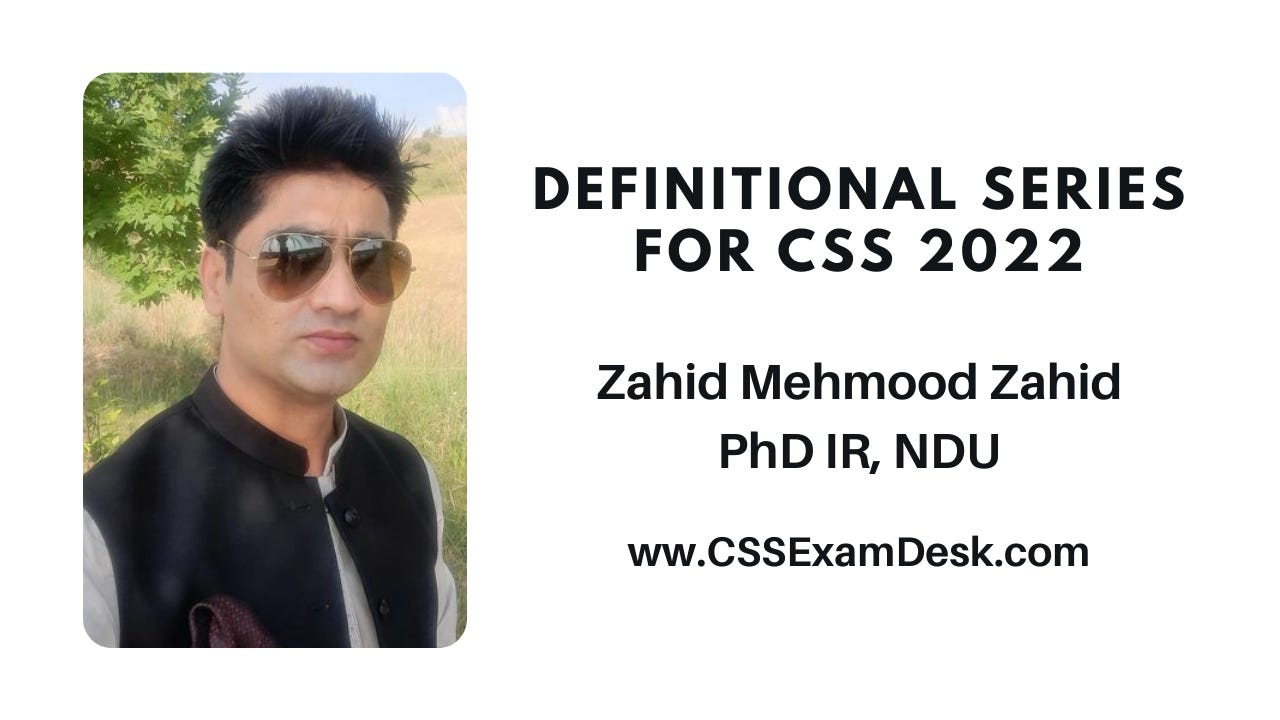Definitional Series For CSS 2022
by Zahid Mehmood Zahid, PhD scholar at IR Department NDU and political analyst
International political economy (IPE): "The study of the politics of trade, monetary, and other economic relations among nations, and their connection to other transnational forces."
Non State Actors: "Actors other than state governments that operate either below the level of the state (that is, within states) or across state borders."
Globalization: "The increasing integration of the world in terms of communications, culture, and economics; may also refer to changing subjective experiences of space and time accompanying this process."
North-South Gap: "The disparity in resources (income, wealth, and power) between the industrialised, relatively rich countries of the West (and the former East) and the poorer countries of Africa, the Middle East, and much of Asia and Latin America."
League of Nations: "An organization established after World War I and a forerunner of today’s United Nations; it achieved certain humanitarian and other successes but was weakened by the absence of U.S. membership and by its own lack of effectiveness in ensuring collective security. See also collective security."
Cold War: "The hostile relations—punctuated by occasional periods of improvement, or détente—between the two superpowers, the United States and the Soviet Union, from 1945 to 1990."
Containment Policy: "A policy adopted in the late 1940s by which the United States sought to halt the global expansion of Soviet influence on several levels—military, political, ideological, and economic."
Prisoner’s Dilemma: "A game in which two prisoners rationally choose not to cooperate in order to avoid even worse outcomes."
Summit Meeting: "A meeting between heads of state, often referring to leaders of great powers, as in the Cold War superpower summits between the United States and the Soviet Union or today’s meetings of the Group of Twenty (G20) on economic coordination."
Power: "The ability or potential to influence others’ behavior, as measured by the possession of certain tangible and intangible characteristics."
Geopolitics: "a focus on a country’s location and geography as the basis of its national interests." OR "The use of geography as an element of power, and the ideas about it held by political leaders and scholars."
Security Dilemma: "A situation in which actions that states take to ensure their own security (such as deploying more military forces) are perceived as threats to the security of other states." OR "The situation that states face when they arm to defend themselves and in the process threaten other states."
Balance of Power: "The general concept of the power of one or more states being used to balance that of another state or group of states. The term can refer to (1) any ratio of power capabilities between states or alliances, (2) a relatively equal ratio, or (3) the process by which counterbalancing coalitions have repeatedly formed to prevent one state from conquering an entire region." OR "The strategy by which states counterbalance to ensure that no single state dominates the system, or an outcome that establishes a rough equilibrium among states."
National Interest: "The goals that states pursue to maximize what they perceive to be selfishly best for their country."
Defensive Realism: "variant of realist theory that emphasizes the preservation of power (maximisation of security) , as opposed to the expansion of power, as an actor’s primary security objective."
IMPORTANT LINKS:


Thank you sir for your valuable efforts...
Well define Sir G